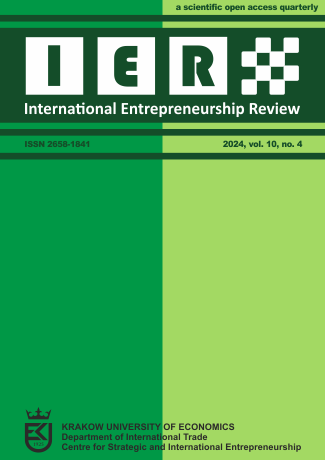How it started, how it evolved: Ukrainian entrepreneurship in Poland

Abstract
Objective: This exploratory article analyses the entrepreneurial activities of Ukrainian immigrants in Poland from 2018 to the present. We examine immigrant and refugee entrepreneurship as part of socio-economic adaptation. Despite being the largest immigrant group, Ukrainian entrepreneurship remained limited until 2022. The article highlights three key events-the Revolution of Dignity, the COVID-19 pandemic, and the Russian invasion-and their effects on entrepreneurial activity.
Research Design & Methods: We used a mixed methods approach, focusing on three waves of qualitative surveys with Ukrainian entrepreneurs in Małopolska, Southern Poland. The first round (April-August 2018) included 32 interviews. The second round (May-August 2021) during the COVID-19 pandemic involved 20 immigrant entrepreneurs, including seven Ukrainians. The third round (May-October 2023) focused on 10 Ukrainian refugees. This qualitative data is supplemented by two large-scale surveys: one with 607 respondents (November 2021-January 2022) and another with 500 Ukrainian refugees (May-June 2022), both in Małopolska.
Findings: Initially, Ukrainian entrepreneurs in Poland focused on mainstream businesses with limited use of ethnic or transnational networks. The COVID-19 pandemic disrupted business but prompted proactive measures. Paradoxically, border closures increased demand for ethnic goods and services. Businesses established by refugees after 2022 now mainly cater to ethnic customers, marking the rise of an ethnic enclave economy.
Implications & Recommendations: Our study shows that refugees benefit from an expanded ethnic market and ethnic solidarity when settling in areas with established immigrants from the same background. However, the key factor is Poland’s favourable entrepreneurial environment, with ease of starting a business. Poland’s laissez-faire approach, marked by limited social benefits, can support socio-economic integration, especially when refugees have immediate access to the labor market and the ability to start businesses.
Contribution & Value Added: This study contributes to the literature on immigrant and refugee entrepreneurship in several ways. First, it highlights the unique dynamic between economic immigrants and war refugees in the Ukrainian diaspora in Poland, where refugees leverage existing ethnic networks for socio-economic adaptation. Second, the cultural and linguistic proximity between Poles and Ukrainians aids smoother integration. Third, despite the war, many Ukrainian entrepreneurs maintain transnational networks with clients and partners in Ukraine.
Keywords
Immigrants, refugees, entrepreneurship, adaptation, Ukraine
Author Biography
Konrad Pędziwiatr
Associate Professor of Department of International Relations and Deputy-Director of CASPAR (Centre for Advanced Studies of Population and Religion) at Krakow University of Economics, Poland. His research interests include: religious identity and practices of immigrants, socio-cultural integration of immigrants and refugees.
Hanna Smaliichuk
Post-Doc researcher of Jagiellonian Centre for Migration Studies and Adjuct Professor at the Kyiv National Economic University. Her research interests include: integration and reintegration of immigrants and return migrants, the importance of migration networks, intercultural communication.
Inna Voznyuk
Doctoral student at the Jagiellonian Centre for Migration Studies. Her research interests include: immigrant entrepreneurship and social integration of immigrants and refugees.
Jan Brzozowski
Associate Professor of Institute of European Studies and Director of Jagiellonian Centre for Migration Studies at Jagiellonian University in Kraków, Poland. His research interests include immigrant & refugee entrepreneurship, labor market performance of migrants, social remittances, immigrant transnationalism.
References
- Brieger, S., & Gielnik, M. (2021). Understanding the Gender Gap in Immigrant Entrepreneurship: A Multi-Country Study of Immigrants’ Embeddedness in Economic, Social, and Institutional Contexts. Small Business Economics, 56(3), 1007-31. https://doi.org/10.1007/s11187-019-00314-x
- Brzozowski J., Kaczorowski, K., Pędziwiatr K., & Wiktor-Mach, D. (2020). Pandemia covid-19 a sytuacja imigrantów w Krakowie, Obserwatorium Wielokulturowości i Migracji. Uniwersytet Ekonomiczny w Krakowie.
- Brzozowski, J., & Voznnyuk, I. (2024). Refugee entrepreneurship: Systematic literature review. International Entrepreneurship Review, 10(4), 23-39. https://doi.org/10.15678/IER.2024.1004.02
- Chang, C.A. (2023). Beyond Social Capital: An Examination of the Sustaining and Expansion of Turkey-based Syrian Refugee Businesspeople’s Business Operations. Journal of Immigrant & Refugee Studies, 1-14. https://doi.org/10.1080/15562948.2023.2196509
- Curci, R., & Mackoy, R. (2010). Immigrant business enterprises: A classification framework conceptualization and test. Thunderbird International Business Review, 52(2), 107-121. https://doi.org/10.1002/tie.20318
- Drinkwater, S., & Garapich, M.P. (2015). Migration strategies of Polish migrants: Do they have any at all?. Journal of Ethnic and Migration Studies, 41(12), 1909-1931. https://doi.org/10.1080/1369183X.2015.1027180
- Duszczyk, M., Górny, A., Kaczmarczyk, P., & Kubisiak, A. (2023). War refugees from Ukraine in Poland–one year after the Russian aggression. Socioeconomic consequences and challenges. Regional Science Policy & Practice, 15(1), 181-199. https://doi.org/10.1111/rsp3.12642
- Erdal, M.B., & Oeppen, C. (2020). Forced to leave? The discursive and analytical significance of describing migration as forced and voluntary. In Aspiration, desire and the drivers of migration (pp. 73-90). Routledge. https://doi.org/10.1080/1369183X.2017.1384149
- Grzymala-Kazlowska, A. (2018). From connecting to social anchoring: Adaptation and ‘settlement’of Polish migrants in the UK. Journal of Ethnic and Migration Studies, 44(2), 252-269. https://doi.org/10.1080/1369183X.2017.1341713
- Kachkar, O., Mohammed, M.O., Saad, N., & Kayadibi, S. (2016). Refugee Microenterprises: Prospects and Challenges. Journal of Asian & African Social Science & Humanities, 2(4), 55-69. Retrieved from https://journals.sagepub.com/doi/full/10.1177/01979183231182669 on May 1, 2024.
- Kloosterman, R.C. (2010). Matching Opportunities with Resources: A Framework for Analysing (Migrant) Entrepreneurship from a Mixed Embeddedness Perspective. Entrepreneurship & Regional Development, 22(1), 25-45. https://doi.org/10.1080/08985620903220488
- Kohlenberger, J., Buber-Ennser, I., Pędziwiatr, K., Rengs, B., Setz, I., Brzozowski, J., Riederer, B., Tarasiuk, O., & Pronizius, E. (2023). High self-selection of Ukrainian refugees into Europe: Evidence from Kraków and Vienna. Plos One, 18(12). https://doi.org/10.1371/journal.pone.0279783
- Light, I., Sabagh, G., Bozorgmehr, M., & Der-Martirosian, C. (1994). Beyond the Ethnic Enclave Economy. Social Problems, 41(1), 65-80. https://doi.org/10.2307/3096842
- New Scots: Refugee integration strategy 2018 to 2022. Retrieved from https://www.gov.scot/publications/new-scots-refugee-integration-strategy-2018-2022/ on May 1, 2024.
- Newman, A., Macaulay, L., & Dunwoodie, K. (2023). Refugee Entrepreneurship: A Systematic Review of Prior Research and Agenda for Future Research. International Migration Review, Advance online publication. https://doi.org/10.1177/01979183231182669
- Thompson, D.K. (2016). Risky business and geographies of refugee capitalism in the Somali migrant economy of Gauteng, South Africa. Journal of Ethnic and Migration Studies, 42(1), 120-135. https://doi.org/10.1080/1369183X.2015.1073580
- Waldinger, R. (1989). Structural opportunity or ethnic advantage? Immigrant business development in New York. International Migration Review, 23(1), 48-72. https://doi.org/10.1177/019791838902300103
- Wauters, B., & Lambrecht, J. (2006). Refugee Entrepreneurship in Belgium: Potential and Practice. International Entrepreneurship & Management Journal, 2(4), 509-25. https://doi.org/10.1007/s11365-006-0008-x
